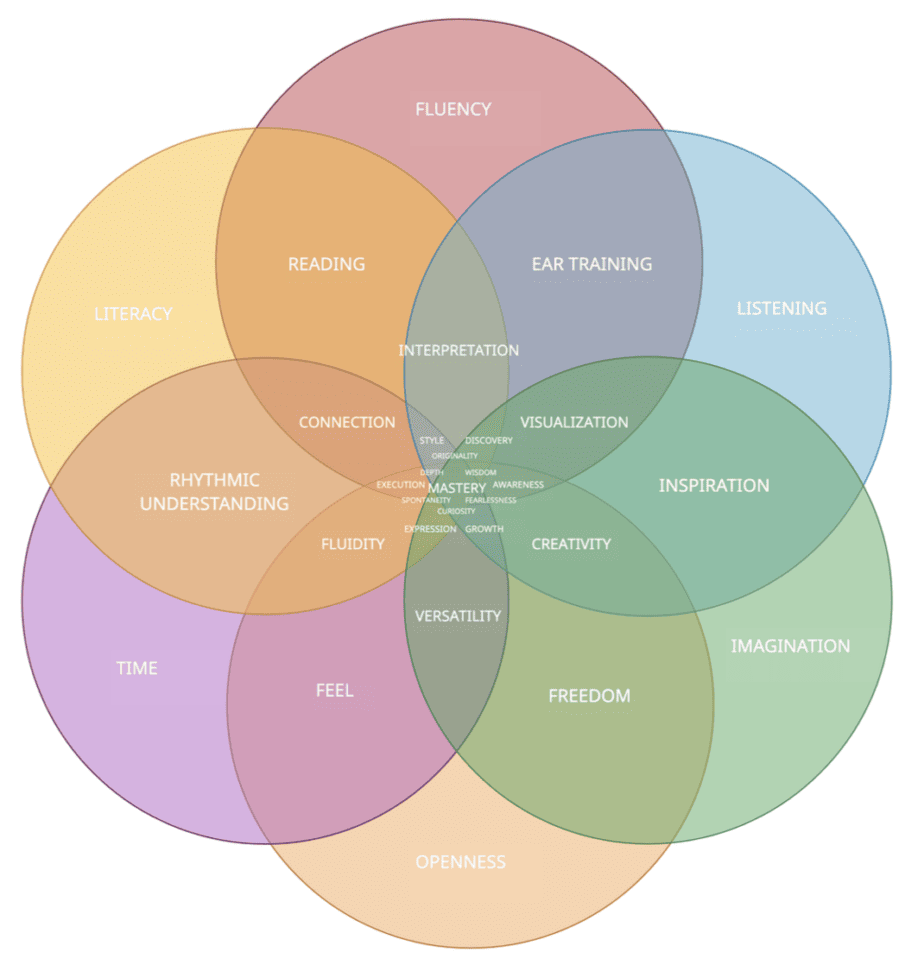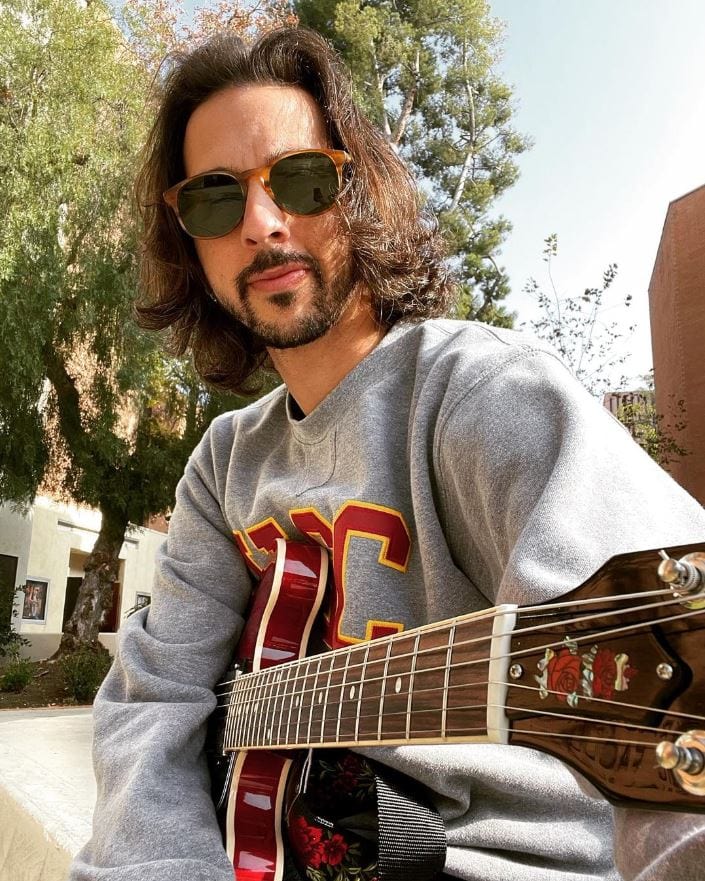If you’ve put serious time into mastering your instrument, you might be toying with the idea of becoming a professional studio guitarist. Maybe you’ve been playing locally for a while and you want to take your career to the next level. Perhaps you have completed studying music at a higher education institution, and you’re looking to make a splash as a great new guitar voice. Or maybe you just really like being creative and collaborating with other like-minded people.
Working as a studio guitarist is a great gig, but it’s one that very few people seemingly have, so how do you do it? Out of the thousands upon thousands of aspiring professional guitarists, how do you separate yourself from the rest of the pack?
For over a decade I have been professionally touring and recording with all kinds of artists and bands, from pop to Americana, rock to jazz, and beyond. From playing pedal steel in the American Idol band to recording acoustic guitar for a film soundtrack, I’ve been fortunate to enjoy a broad and diverse career as a professional guitarist on stages, in recording studios, and on the sound stages of Hollywood. I’ve also had a successful career as a songwriter and producer, having many original songs synced in TV, film, and advertisements.
Contents
The following advice comes as the result of years of trial and error, adaptation, succeeding, failing, and – most importantly – learning and growing. I like to break it down into four areas:
1. Networking Forming relationships
2. The six master skills
3. The niche
4. The intangibles
1. Networking Forming relationships
The single most important thing you can do if you are trying to make it as a session guitarist is to form relationships. Something that we need to understand right off the bat is that this sphere of the music business is unlike most other industries in that it’s a community.
I personally don’t like the term networking. In my experience, networking feels very business-like, in the sense that you’re seeking opportunity and trying to climb a ladder. While you most definitely are trying to create opportunities for yourself, the creative wing of the music industry is a community first and foremost – opportunists need not apply.
Rather than just showing up with business cards and telling everyone you play guitar, focus on forming relationships with other musicians, artists, producers, engineers, and songwriters. This will always work in your favor. Ten times out of ten, your friends will either call you or recommend you over someone they don’t know or trust.
That being said, you need to decide if you want to be a part of a scene or an industry. Becoming a session musician, and more broadly, a high-level professional musician involves being located in a city where either a scene or an industry exists.
In the United States, you can find a thriving music scene in almost any metropolitan area – from Philadelphia to Dallas to Columbus to Seattle. A music scene consists of local artists, bands, producers, and engineers that thrive in their respective communities.
The industry is the broad umbrella of music-related business that produces the music we consume on a national and international scale. Cities like Los Angeles (where I live), New York, and Nashville are the big three in the US. These cities are home to many of the music professionals who create what we hear on the radio, in film, and beyond.
Being a session guitarist is possible in either of these scenarios, though the pool of opportunity is likely smaller in a scene city versus an industry city. If you’re seriously considering a career as a session guitarist, you should think about immersing yourself in one of these locations.
Sure, these days we can record ourselves from home and send tracks to one another, but the key to thriving as a session guitarist is forming relationships. That’s near impossible to do if you’re physically far from the center of the action.
A great way to form relationships is to surround yourself with like-minded people. Going to watch musicians, bands, and artists live is a great way to get started with this. Eventually, you’ll find yourself immersed in your local community, playing gigs by way of your connections or subbing in for someone who may be busy. The more active you are in your local scene, the more people will know who you are and will be more likely to pass opportunities your way.
2. The six master skills
Music is an art, and all art is subjective. There’s no right or wrong way to create and there’s definitely no absolute authority over what is good or bad art.
The best you can do as an artist – especially one who is seeking to help others create their art – is to master your craft as best as you can in six areas:
1. Fluency
2. Listening
3. Literacy
4. Time
5. Imagination
6. Openness
The six master skills are a way to organize broad aspects of musicianship and understand how they intersect and feed one another. These are in no particular order, and one doesn’t take precedence over the other. Rather, the six master skills form a fluid philosophy of the elements of mastery over your instrument.
1. Fluency
- Know your instrument inside and out.
- Knowing all of the common arteries (i.e. octaves, string sets, triads, scales, and modes, etc) all over the fretboard.
- Be able to summon any progression, voicing, or melody on command.
Gear fluency
- Understand how your instrument works and be able to get not only the best sound out of it but the appropriate sound for what you are doing.
- Know how to tweak your amps and pedals to best fit the vibe.
- Many times you will be asked to play “more earthy” or “shinier” or “less pokey and more dream-like”, and you’ll need to know how to translate and achieve that on the fly.
Genre fluency
- It goes without saying that you’ll need to have a certain degree of genre versatility.
- You may have to record both a country song and an R&B song in one day.
- Genre fluency doesn’t mean that you need to have a full dictionary’s worth of vocabulary for every genre.
- Rather, you should know the basic hallmarks of specific sounds and how to achieve them.
2. Listening
Listening is the practice of heightening our awareness to what’s happening around us.
- A trained ear is going to be your best asset.
- As session guitarists, we need to be able to synthesize what we’re hearing and how to translate it to the guitar.
- Understanding harmony and harmonic movement as it pertains to style and nuance is key.
- You should also know how to recognize tones and pick out parts from recordings, or pull from a mental reference database of common domain music (i.e. a George-Harrison slide sound, the Bo-Diddly beat, or David-Gilmour phrasing).
- Train your reaction reflexes and develop the instinct to play the right thing at the right time.
- Read the other musicians in the room and find where you fit.
- The producer may ask you, ‘What are you hearing here?’, in which you’re then tasked with using the space around you to find the right part.
3. Literacy
The ability to read notation and/or charts is not only helpful, it can sometimes be the thing that separates you from the rest of the pack.
- Guitarists are notoriously poor sight readers, so if you can read standard notation, it may qualify you for certain sessions like film and TV scoring sessions.
- A visual, especially for guitarists, is extremely useful.
- To see the shapes on our fretboard spelled out on paper helps us understand how and why the language of music is spoken the way it is.
- This fosters a deeper understanding of style and inflection.
- The ability to write your own charts is a lifesaver.
- Everyone has their own shorthand, but to be able to quickly jot down a melodic or rhythmic phrase can be the difference between nailing a part in one take, or ten.
4. Time
Music doesn’t come out of the guitar, it comes out of you!
- Being tuned into our internal rhythms (heartbeat, steps, breath) helps us cue into our internal sense of time.
- Physically manifesting time and rhythm is at first a mental game, and training our bodies to feel time will help us execute on our instruments.
- Understanding subdivision informs us how we feel the music.
- The line between time and feel is very thin, but it makes all the difference in the world when we don’t have to think about time but rather feel it on our own via subdivision and rhythmic placement.
5. Imagination
At the end of the day, we’re making art. Our primary goal as guitarists is to connect to our craft from a non-intellectual place.
- This is a practice of spontaneity and being present in the moment.
- The things that inspire us come from someone else’s imagination, therefore inspiring our own creativity.
- Imagination is one of your greatest assets because it is yours and yours only.
- No two people share the same sense of imagination.
6. Openness
Be open to learning new things and foster a spirit of collaboration.
- As a session guitarist, you’ll likely work with at least one other person, if not a team.
- The best and most productive sessions are the fruits of collaboration where everyone works in harmony to get the best performance possible.
- Aim to be an eternal student and learn from everyone – even if you’re the most experienced person in the room.
- Exposure to new ideas and challenges is an essential part of your growth, not only as a musician but as a person.
- Take the initiative to teach yourself new things – it’ll make you a better and more well-rounded musician

This diagram illustrates how the six master skills intersect and feed one another, producing and strengthening consequential skills as you get closer and closer to mastery. Keep in mind that this is not a guide to true mastery, which I personally believe is unattainable, but rather a road map to being the best musician you can be.
3. The niche
The six master skills prepare us for anything that may musically come your way. If you’re a pro session guitarist, you must be versatile, have great time, and be able to play convincingly in many different styles and genres.
Something that may give you an extra leg up is a niche. A niche is something (or things) you specialize in that not many other people can do.
Some valuable niches:
Doubles: An instrument you can play proficiently aside from your main instrument
- Tone bar instruments like pedal steel, lap steel, and dobro
- Other lutes like mandolin, banjo, and ukulele
- Keyboard instruments like piano, synths, and organs
- Horns such as trumpet, saxophone, and clarinet
- Ethnic instruments like sitar, bouzouki, and koto
- Percussion and drums
Specialty techniques: Not just strumming chords and playing notes!
- Slide guitar – Delta blues, Americana, country, blues, and rock all employ this.
- Finding your own voice with a slide can improve your stock. You can also get cool textures and sounds for pop music if deployed right!
- Shredding – Tapping, sweep picking, blazing fast licks for metal and pop alike.
- The ability not only to shred but to make it tasteful and with great tone is highly sought after.
- Fingerpicking – This is so important in the pop and rock realm in addition to classical and other world styles, for both acoustic and electric guitar.
- Effects wizard – Getting cool and unique sounds from your gear is a niche.
- Some players are meat and potatoes, and some are highly adept at texturizing and sound design using their guitars, pedalboards, and other tools.
Acoustic guitar: Fingerpicking, percussive playing, capo mastery, and solo singer accompaniment.
- The art of coming up with interesting parts and getting a strong acoustic sound is its own niche.
Studio world: Knowledge of songwriting, production, and engineering can help you record yourself and lead you to entirely new heights in your career.
- Remote recording skills will enable you to collaborate with people all over the world.
- Knowing the ins and outs of a studio environment can also help move things along more efficiently as you are familiar with the gear and the protocols involved in being in that environment.
These are just a few examples of niches. Personally, I:
- Branched out to play pedal steel
- Found my voice with a slide
- Put years of focus on fingerpicking and acoustic techniques
- Built and operate my own studio
These have all shaped my career and brought me opportunities I never would have otherwise come across. If you’re considering becoming a session musician, it’s important to discover your niche or niches and find ways to use them to your advantage.
4. The intangibles
Intangibles are the things that you don’t learn in guitar lessons or music school because they aren’t musical skills, they’re human skills. These are the practical skills that, when grouped with your relationships and other musical skills, will earn you a solid reputation and make you somebody that people seek out and want to work with.
1. Be prompt: People are counting on you, trusting you, and giving you an opportunity to work. Respect them and their time.
- Being early shows you care and that you want to be there.
- Give yourself extra time to set up your gear.
- Make sure everything is dialed in and working properly before the session starts.
2. Be confident: You’ve been hired for a reason: you’re talented and in demand!
- Show up with pride and represent yourself like you are your own boss – because you are.
- Know that you can do what is expected of you and that you will be respected if you respect yourself.
- Never be afraid to ask questions if you need more clarification.
Remember, music is a collaborative art, and everyone present shares a common goal. We all want to help each other succeed.
3. Be flexible: Always be ready for change.
- Parts, arrangements, and plans change all the time.
- Being aware and present will help you adapt to any given situation.
- The more flexible you are, the easier you are to work with, which fosters a good reputation among your peers and colleagues.
- Willingness to help goes a long way.
All that said, don’t minimize your worth or stretch yourself too thin. Be honest with yourself and know your limits and boundaries.
4. Be prepared: Know what you need to know by the time you need to know it.
- Coming in prepared is an extension of showing respect for someone else’s time and trust.
- Have the songs learned (or charts made), make sure your gear is dialed, and bring your best attitude.
- Ask questions ahead of time so you have all of the right information before showing up.
If you’re prepared, everything is in your control and you will succeed in the work.
5. Be yourself: Your authentic self is who you are regardless of what style of music you are playing.
- This is a business of connections and relationships.
- With music, we’re all sharing in something deeply personal to us.
- As a musician, you have many superpowers, but above all, you are empathic, passionate, and in touch with your heart.
Good music and good people will help bring out the best in you, and you being your authentic self will help bring out the best in others and in the music.
Becoming a studio guitarist is a long game that can lead to a fun and fulfilling career in music. Your relationships, the six master skills, a niche or two, and the intangibles will give you a well-rounded path to finding your way as a session guitar player wherever you may be.
This career path is not a straight line, and this philosophy is not the answer to immediate success. These ideas are meant to inspire you to think about what it is you really want and where you want to put your focus. With integrity and perseverance, you’ll find yourself in the right place!


